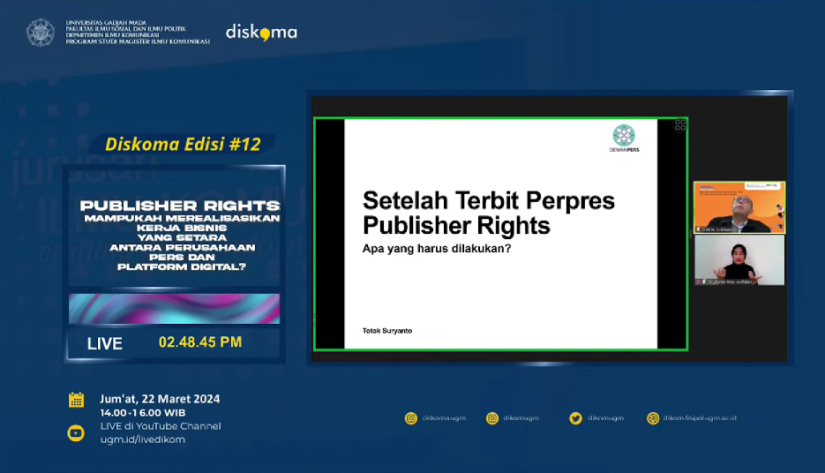
Yogyakarta, March 22nd 2024—President Joko Widodo has just officially released Presidential Regulation of the Republic of Indonesia No. 32 of 2024 concerning the Responsibility of Digital Platforms to Support Quality Journalism on February 20th, 2024. This regulation was issued because conventional media began to be swayed by the massive development of the digital world. Quality journalism is a channel of good information to the public, but unfortunately, the public’s interest in digital media is greater because of the speed and ease of access it offers.
“The government has just issued a policy regarding publisher rights. We will see whether these regulations can have an impact, as we know, many regulations are made just for show in Indonesia. We cannot yet see the impact further. “Regulations are important, but the struggle to realize the benefits they need is extraordinary,” said Secretary of the Master’s Study Program, UGM Department of Communication Sciences, Drs. I Gusti Ngurah Putra, MA. in the DISKOMA series #12 on Friday (22/3).
Digitalization is recognized as a new form of media that has succeeded in disrupting various aspects. One of the biggest impacts is the dissemination of information. In the digital world, people are exposed to a very fast flow of information. Moreover, with the convenience and personalization of digital, people’s interest in information in digital media, especially social media, is higher than in press media. This of course has an impact on the sustainability of the press media business amidst digital disruption. According to the Chair of the Inter-Institutional and Foreign Relations Commission, Indonesian Press Council, Totok Suryanto, several digital platform publishers expressed their objection to this new regulation.
“Publisher Meta, for example, in its meeting with the Press Council at that time stated that it hoped they would not be among those subject to provisions for providing profit sharing to publishers in Indonesia, especially the press. Remember, this Presidential Decree, in the context of the relationship between digital program platforms and the press, does not cover content creators and others. According to them, there is space that they have prepared for publishers in this country to use,” explained Totok.
The same statement was also conveyed by Google. As a global platform, they have established various business collaborations with several press institutions. The majority of cooperation is also aimed at safeguarding quality journalism, therefore they do not want to be subject to these regulations. Based on Totok’s statement, this presidential regulation will later be adjusted to what each publisher has attempted. Meanwhile, currently, the existence of press companies in Indonesia is mushrooming. Different from the past, nowadays digital platforms make it easy for someone to build their digital press media without a lot of capital.
“But on the other hand, we can say that the economic condition of the Indonesian press is currently in a worrying position. This means that so many media are born, so many content distribution devices, then there are lots of choices for advertisers and it becomes easier. So in this worrying condition, we are trying to formulate some kind of rules so that there is fairness in interactions between the press and global platforms,” explained Totok.
The Presidential Decree is said to be an effective and fast way to overcome problems on two sides. Through the release of this regulation, it is hoped that two main objectives can be achieved. First, create quality journalism that can be distributed on global platforms. And on the other hand, press media can earn income as publishers in digital media. It is also an implementation of the 17th Sustainable Development Goal, namely “Partnership to Achieve Goals”. So it is hoped that this collaboration can encourage the strengthening of the press as quality information for the public.
